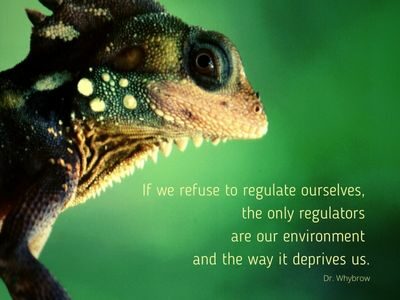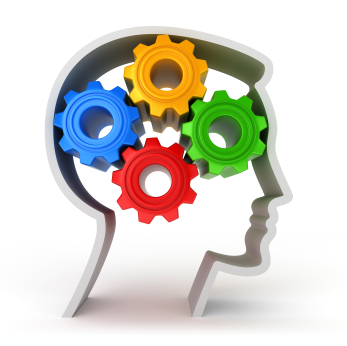Last updated on July 14th, 2022 at 03:28 pm
 Allow me to tell you my tale of money, the lizard brain, the Big Change, and me.
Allow me to tell you my tale of money, the lizard brain, the Big Change, and me.
I was reading a great article in a past issue of Vanity Fair magazine, about how California is the poster child for economic collapse. If you live in California and feel like having a big helping of hopelessness, I highly recommend it.
But anyway, the article introduced me to Dr. Peter Whybrow, a UCLA neuroscientist who applies the workings of the lizard brain to the context of American life.
The lizard brain is the amygdala, the most ancient part of the human brain. It’s the part of the brain that deals with danger, fear, and primitive impulses. It’s the brain we honed through many long years of scarcity, when we had to compete for every morsel of food, look for danger everywhere, and treat every other thing, living and not, as a threat to our very survival.
Dr. Whybrow says that we are well-equipped for scarcity, and ill-prepared for our present reality: abundance.
The lizard brain, confronted with the Thanksgiving groaning board, tells us to eat and eat and keep on eating long past the point where we are far more stuffed than the bird. We do this because we may not see food again for a very long time. The lizard brain, on seeing gadgets, books, yarn, or (fill in your impulses here), convinces us that we must snap up all of these commodities now, while we still can, before they become extinct or before someone else snaps them up and becomes more powerful than we are.
The lizard brain believes hoarding and consuming are the pathways to survival, even if what we are hoarding and consuming is actually, by any rational, subjective measure, contraindicated for survival.
I love this quote from Dr. Whybrow:
If we refuse to regulate ourselves, the only regulators are our environment and the way it deprives us.
That, my dears, is what big holiday letdowns are really about. The lizard brain, sated, goes back to sleep, and the “new” brain takes over the controls. Here lives our power for a reason, abstract thought, and memory. This new brain is what separates us from the apes. It’s also what makes us feel icky.
“What a pig you are,” it says.
“More BOOKS?” it complains.
“Why, oh WHY, did you spend so damn much money?” it accuses.
Does this seem backward to anyone else? Could we not have the new brain first, to set the boundaries of reason and feasibility, and then let the lizard brain graze inside the compound?
I guess not. Too easy.
In an interview with Scott and Jarett, the inventors of the Big Change app, one of them commented that the hardest part about making any change is taking the first step. Right, because when the lizard brain is in control, it doesn’t like it when the rational brain tries to take over the bridge. The lizard brain will cling to power as Khadafi clung to Libya, laying waste to whatever gets in the way.
This explains why, as of now, I have installed Big Change, yes. I have read about Big Change, sure. I’ve been to the website for Big Change several times. I hung around the Facebook page, even. I have promised, in print, to use Big Change, and publish a review.
But I have not, as of yet, actually turned on Big Change.
Every time I think about doing it, my lizard brain, like the robot in Lost in Space, starts waving its arms wildly and shouting over and over, DANGER Will Robinson! DANGER.
Clearly, the lizard brain felt I must have Big Change, but not that I should actually use it.
So I am starting all over this week. As I noted, I have a month between now and the next intersection of Over-Indulgence and Reality. This gives me plenty of time to plan a different route. One that takes the bypass, or the fly-over, or the scenic route–anything to avoid that intersection.
Big Change, here I come.
Jayne Speich
Jayne Speich is co-founder of Business Growth Advocate dedicated to the survival and growth of small businesses in the new era.

Enjoy this special 8WomenDream Guest Contributor story submitted by new and experienced big dreamers throughout the world, edited and published to capture a dream perspective from different points of view. Do you have a personal dream story to share with 8WomenDream readers? Click here to learn how to submit dream big articles for consideration.
Note: Articles by Guest Post Contributors may contain affiliate links and may be compensated if you make a purchase after clicking on an affiliate link.




